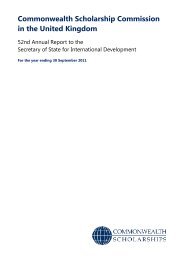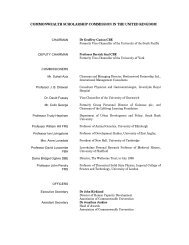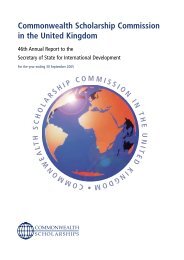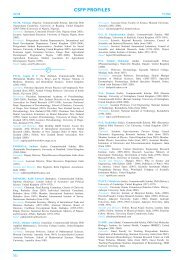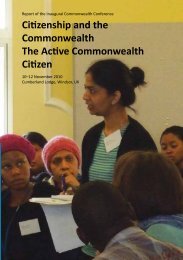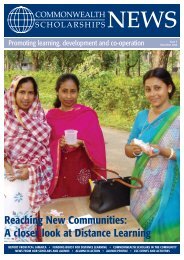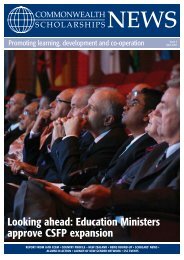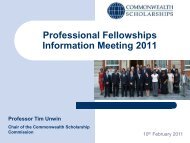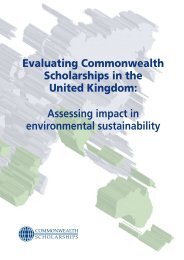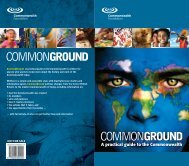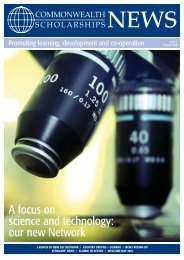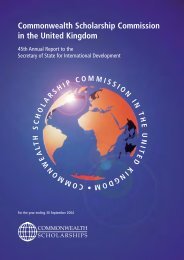43rd Annual Report - Commonwealth Scholarship Commission in ...
43rd Annual Report - Commonwealth Scholarship Commission in ...
43rd Annual Report - Commonwealth Scholarship Commission in ...
- No tags were found...
You also want an ePaper? Increase the reach of your titles
YUMPU automatically turns print PDFs into web optimized ePapers that Google loves.
2003 SELECTIONSScholars and Fellows on award dur<strong>in</strong>g the2001/2002 Academic YearSchemeNo<strong>Commonwealth</strong> General <strong>Scholarship</strong>s 398<strong>Commonwealth</strong> Split-site<strong>Scholarship</strong>s 18<strong>Commonwealth</strong> Academic Staff<strong>Scholarship</strong>s 105<strong>Commonwealth</strong> Fellowships 78TOTAL 5992002 Selections: General Scholars by regionRegion Target% Actual%Sub-Saharan Africa 50 57South Asia 30 26Others 20 17The number of new awards taken up <strong>in</strong> 2002 rose from 291 to 365 – an <strong>in</strong>crease of25%. This <strong>in</strong>crease was concentrated on those countries supported by the Departmentfor International Development, which accounted for 293 awards, compared with 215<strong>in</strong> the previous year. The number of new awards supported by the Foreign and<strong>Commonwealth</strong> Office decl<strong>in</strong>ed slightly, from 78 to 72. These figures exclude awardsmade dur<strong>in</strong>g 2002-03 for the new programmes of distance learn<strong>in</strong>g scholarships andprofessional fellowships, s<strong>in</strong>ce these were taken up after the period covered by thisreport.Regional QuotasThe <strong>Commission</strong> does not allocate specific numbers of awards to <strong>in</strong>dividual countries,s<strong>in</strong>ce it seeks to encourage open competition between candidates. In recent years,however, it has adopted loose targets for the division of General <strong>Scholarship</strong>s betweenregions. These were revised <strong>in</strong> our 2000 review to place more emphasis on sub-Saharan Africa, which had under-performed dur<strong>in</strong>g the 1990’s.This aim was more than fulfilled dur<strong>in</strong>g the year, with 57% of the awards concernedgo<strong>in</strong>g to Africa. Southern Asia took 26%, compared with a 30% target, and othercountries 17%. Whilst the <strong>Commission</strong> welcomes this development <strong>in</strong> the short term,s<strong>in</strong>ce it reflects a significant <strong>in</strong>crease <strong>in</strong> the quality of candidates from Africa, it willreta<strong>in</strong> the previous targets for 2003.A more complete picture of success rates can be seen by compar<strong>in</strong>g nom<strong>in</strong>ations,selections and awards taken up. Africa was responsible for 40% of the 888 eligiblenom<strong>in</strong>ations, and received 38% of the awards offered. The 47% success rate ofAfrican candidates was almost identical to that for those from South Asia and thecomb<strong>in</strong>ed ‘other’ regions. In <strong>in</strong>terpret<strong>in</strong>g these figures, it should be remembered thatselection by the <strong>Commission</strong> represents only part of the process, and that candidateshave to undergo highly competitive procedures <strong>in</strong> order to secure their nom<strong>in</strong>ation.General <strong>Scholarship</strong>s are the only <strong>Commission</strong> programme through which awards areavailable to all <strong>Commonwealth</strong> countries. In the case of Academic Staff <strong>Scholarship</strong>s,awards are concentrated on universities <strong>in</strong> the poorest third of the United NationsHuman Development Index, and sub-Saharan Africa. Academic Fellowships andSplit-site Doctorates are also concentrated on particular develop<strong>in</strong>g countries.2002 Selections: Scholars by level of studyAwards Taught% Research%FCO FundedGeneral <strong>Scholarship</strong>s 66 34DFID FundedGeneral <strong>Scholarship</strong>s 62 * 38CASS 43 57All 61 39*Includes one undergraduate awardType of CourseWith<strong>in</strong> the General <strong>Scholarship</strong>s category, selections cont<strong>in</strong>ued the move of recentyears away from doctorates to taught courses, often of a more directly vocationalnature. This policy was adopted follow<strong>in</strong>g our 2000 review, and endorsed <strong>in</strong> asubsequent survey of national nom<strong>in</strong>at<strong>in</strong>g agencies. The 62% of DFID funded generalscholarships awarded for taught courses was the highest for several years, <strong>in</strong>creas<strong>in</strong>gfrom 49% <strong>in</strong> 2002. The figure reflects both overall policy, and our desire not to <strong>in</strong>curabnormally high cont<strong>in</strong>uer costs by us<strong>in</strong>g this year’s budget <strong>in</strong>crease on three yearawards. The proportion of FCO funded awards for taught courses also cont<strong>in</strong>ued torise, the figure of 66% compar<strong>in</strong>g with 59% the previous year.The trend towards taught courses was most marked <strong>in</strong> the case of Academic Staff<strong>Scholarship</strong>s. These have traditionally concentrated on doctorates, <strong>in</strong> response to theexpressed needs of recipient universities. Last year, 85% of awards were <strong>in</strong> thiscategory; <strong>in</strong> 2002 the figure decl<strong>in</strong>ed to 57%. Support for Split-site Doctorates, however,<strong>in</strong>creased significantly, with the highest ever number of awards – 30 – compar<strong>in</strong>g with18 <strong>in</strong> 2001.Selection By GenderThe <strong>Commission</strong> does not rout<strong>in</strong>ely discrim<strong>in</strong>ate <strong>in</strong> favour of women <strong>in</strong> its selection process,but <strong>in</strong> recent years has <strong>in</strong>creas<strong>in</strong>gly highlighted to nom<strong>in</strong>at<strong>in</strong>g agencies the need to ensure afair gender balance <strong>in</strong> their selections. Our awards also make provision for spouses anddependent children. This year’s figures suggest that this policy is hav<strong>in</strong>g positive effects.In 2001, the proportion of new female General Scholars reached 50% for the first time.CSC <strong>Annual</strong> <strong>Report</strong> page 18



